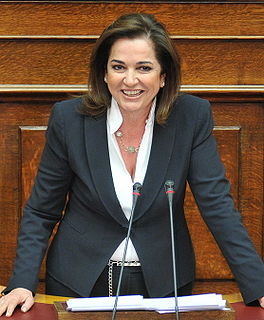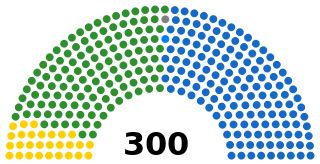
Konstantinos Mitsotakis was a Greek politician who was Prime Minister of Greece from 1990 to 1993. He graduated in law and economics from the University of Athens.
Georgios Ioannou Rallis, anglicised to George Rallis, was a Greek conservative politician and Prime Minister of Greece from 1980 to 1981.
Tzannis Tzannetakis was a Greek politician who was briefly Prime Minister of Greece during the political crisis of 1989.

Theodora "Dora" Bakoyannis, is a Greek politician. From 2006 to 2009 she was Minister of Foreign Affairs of Greece, the highest position ever to have been held by a woman in the Cabinet of Greece at the time; she was also Chairperson-in-Office of the Organization for Security and Co-operation in Europe in 2009. Previously she was the Mayor of Athens from 2003 to 2006, the first female mayor in the city's history, and the first woman to serve as mayor of a city hosting the Olympic Games. She also served as Minister for Culture of Greece from 1992 to 1993. She has been serving as an independent member of the Hellenic Parliament representing unofficially Democratic Alliance, the political party she founded in 2010, having been expelled from the opposition New Democracy party due to voting against the party line. In May 2012, due to the critical situation in Greece before the elections and given the established electoral law, Democratic Alliance decided to cooperate with New Democracy, based on a specific framework of values and to suspend its activities. Dora Bakoyannis rejoined New Democracy on 21 May 2012, ahead of the parliamentary election in June, where she headed the state deputies' ballot.
This article gives an overview of liberalism in Greece. It is limited to liberal parties. The sign ⇒ denotes another party in that scheme. For inclusion in this scheme it isn't necessary so that parties labeled themselves as a liberal party.

Ioannis Alevras was a Greek Panhellenic Socialist Movement politician and Speaker of the Hellenic Parliament, who served as acting President of Greece in March 1985.
The Liberal Party, also the National Progressive Centre Union since 1952, was a major political party in Greece during the early-to-mid 20th century. It was founded in August 1910 by Eleftherios Venizelos and went on to dominate Greek politics for a considerable number of years until its decline following the Second World War. Among its most well-known members, apart from Venizelos, were Alexandros Papanastasiou, Nikolaos Plastiras, Georgios Papandreou and Konstantinos Mitsotakis.

Kyriakos Mitsotakis is a Greek politician who has been President of New Democracy and Leader of the Opposition since January 2016. He served as Minister of Administrative Reform and e-Governance from 2011 to 2015. He has been a Member of the Hellenic Parliament for the Athens B parliamentary constituency since 2004.

Parliamentary elections were held in Greece on Sunday, 18 October 1981. The Panhellenic Socialist Movement (PASOK), led by Andreas Papandreou, faced New Democracy, led by Georgios Rallis. Papandreou achieved a landslide and PASOK formed the first socialist government in the history of Greece.

Early parliamentary elections were held in Greece on 8 April 1990. The conservative New Democracy party of Constantine Mitsotakis, was elected, defeating the Panhellenic Socialist Movement (PASOK) of Andreas Papandreou. In order to be able to command a majority of 151 in the 300-seat Parliament, New Democracy had to secure the support of Theodoros Katsikis, Democratic Renewal's sole MP. Shortly after Mitsotakis was given a confidence vote, Supreme Special Court, after a mistake in seat calculation was detected, gave New Democracy a 152nd seat.
The Party of New Liberals was a shortly lived liberal political party in Greece.

Parliamentary elections were held in Greece on 18 June 1989. The liberal-conservative New Democracy party of Constantine Mitsotakis defeated the Panhellenic Socialist Movement (PASOK) of Andreas Papandreou. However, New Democracy could not form a government, despite its 5% lead in the popular vote, because of the Proportional representation voted into electoral law by the previous PASOK government.

Early parliamentary elections were held in Greece on 5 November 1989. The liberal-conservative New Democracy party of Constantine Mitsotakis emerged as the largest party in Parliament, defeating the Panhellenic Socialist Movement (PASOK) of Andreas Papandreou. However, as in June 1989, Mitsotakis was unable to form a government since his party had failed to win a majority of seats.

Parliamentary elections were held in Greece on 10 October 1993. The Panhellenic Socialist Movement (PASOK) of Andreas Papandreou, was elected with 170 of the 300 seats, defeating the conservative New Democracy party of Constantine Mitsotakis.
Democratic Renewal was a Greek political party founded by Konstantinos Stephanopoulos on September 6, 1985. It continued to exist until June 1994.
In early 2006, Prime Minister Kostas Karamanlis announced ruling New Democracy's initiative for a new amendment of the Greek Constitution of 1975/1986/2001, and clarified his propositions speaking to the deputies of his party on 11 May 2006.
Marika Mitsotakis was the wife of the former Prime Minister of Greece Konstantinos Mitsotakis. She was regarded as a prominent political voice with the New Democracy political party, her husband's government, and Greek politics. She was nicknamed "Mrs. Marika" among Greeks.

The 2015–16 New Democracy leadership election refers to the two-round election to determine the next president of New Democracy, after the resignation of Antonis Samaras on 5 July 2015. The first round was held on 20 December 2015 and the second round was held on 10 January 2016. Kyriakos Mitsotakis was elected as the new president.
The Shadow Cabinet of Kyriakos Mitsotakis was announced on 21 January 2016, ten days after the election of Kyriakos Mitsotakis as President of New Democracy. As Leader of the Opposition, Mitsotakis can appoint a shadow cabinet to assist him in his duties.














